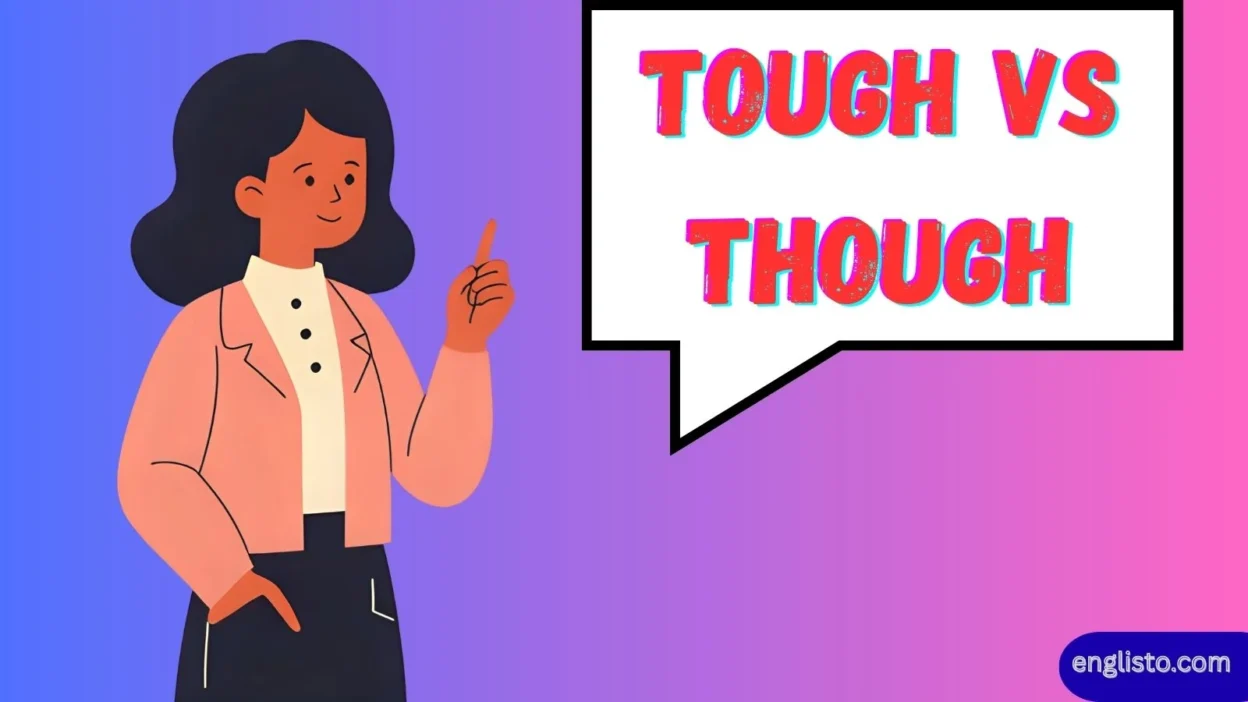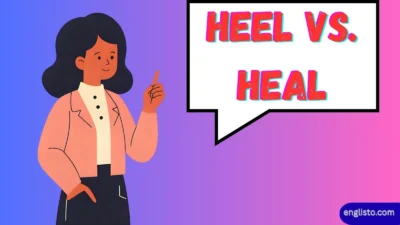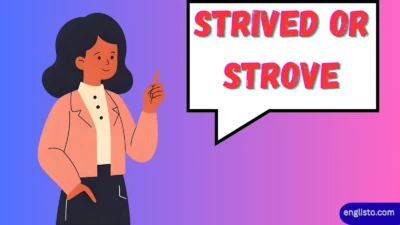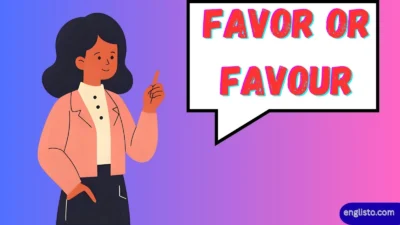Learning English often feels like solving a never-ending puzzle—especially when it comes to words that look similar but mean completely different things. “Tough” and “Though” are classic examples. They’re short, commonly used, and often confused, but in reality, they belong to different categories of grammar and serve unique functions. Tough vs Though.
In this in-depth guide, we’ll break down the meanings, pronunciations, grammatical roles, and real-life examples of tough vs though. You’ll also find handy tables, side-by-side comparisons, and practical tips to ensure you never mix them up again.
What Does “Tough” Mean?
“Tough” is an adjective that describes something strong, durable, or hard to deal with. It’s often used when talking about materials, situations, or people who show strength and resilience.
- Pronunciation: /tʌf/ (short “u” sound + ends with “f”).
- Word Category: Adjective (sometimes used as a noun in slang, e.g., “a tough”).
- Meaning: Sturdy, resilient, or difficult.
Examples of “Tough” in Sentences
- The boots were so tough they lasted through ten hiking trips.
- She remained tough despite unfavorable circumstances.
- Passing the exam was tough, but he managed to do it.
- These blue jeans are tough enough to endure years of wear.
Synonyms for “Tough”
| Synonym | Context Example |
| Durable | The tent is durable and will last many seasons. |
| Strong | The negotiator was strong and never backed down. |
| Sturdy | This fabric is sturdy and resistant to damage. |
| Resilient | Athletes must be resilient to withstand hardships. |
| Rugged | A rugged phone can survive drops and scratches. |
Read More: Passion vs Compassion: Understanding the Distinction and Their Role in Life
What Does “Though” Mean?
“Though” is a conjunction or an adverb, and it’s used to introduce contrast, exception, or a softer tone in spoken English.
- Pronunciation: /ðoʊ/ (voiced “th” like in this, followed by a long “o” sound).
- Word Category: Conjunction or Adverb.
- Meaning: However, nevertheless, although, or a way of adding a contrasting comment.
Examples of “Though” in Sentences
- I was tired; I managed to finish my work, though.
- She didn’t know the answer; she pretended she did, though.
- It might rain. We’ll go to the concert, though.
- Though he was injured, the athlete kept running.
Synonyms for “Though”
| Synonym | Usage Example |
| Although | Although it was raining, we went for a walk. |
| However | I’m not sure; however, I’ll try my best. |
| Nevertheless | The team was tired; nevertheless, they pushed forward. |
| Yet | It was hard, yet she managed to finish. |
| Still | I didn’t like the movie; still, I watched till the end. |
Tough vs Though: Key Differences
| Feature | Tough | Though |
| Word Type | Adjective (sometimes noun) | Conjunction / Adverb |
| Pronounced | /tʌf/ (short “u” + f) | /ðoʊ/ (voiced th + long o) |
| Meaning | Strong, durable, hard | However, although, nevertheless |
| Function | Describes strength or difficulty | Connects ideas or introduces contrast |
| Example | This fabric is tough. | I was tired, I managed, though. |
Tip: If you can replace the word with strong/durable/difficult, use tough.
If you can replace it with however/although/nevertheless, use though.
The Role of “Tough” in Everyday Language
“Tough” doesn’t just describe physical objects—it also reflects mental, emotional, and social strength. It carries a sense of resilience and grit.
- In Materials: A tent made from tough fabric can withstand harsh weather.
- In People: A firefighter must be tough enough to face danger.
- In Situations: College life can be tough, but rewarding.
Real-Life Example:
- “She endured tough circumstances, yet she remained optimistic.”
The Role of “Though” in Everyday Language
“Though” adds nuance and contrast to communication. It makes speech less formal, and it often appears at the beginning, middle, or end of a sentence.
- At the Beginning: Though it was raining, they went hiking.
- In the Middle: He studied hard, though he wasn’t sure he’d pass.
- At the End: The party was fun. I was tired, though.
Real-Life Example:
- “The movie was confusing. I liked the ending, though.”
Why Do People Confuse “Tough” and “Though”?
- Both words are short and start with “t.”
- English spelling patterns are inconsistent, especially with “-ough.”
- Non-native speakers may pronounce though as tough or vice versa.
Here’s a quick pronunciation guide:
| Word | IPA | Sound Breakdown | Ends With |
| Tough | /tʌf/ | Short “u” + “f” | F sound |
| Though | /ðoʊ/ | Voiced “th” + long “o” | W-like vowel |
Remember: Tough ends with an “f.” Though ends with a long “o.”
Using Both Words in Context
Sometimes, sentences can include both words—showing their different roles:
- “The exam was tough, though he managed to pass.”
- “It’s a tough job. I like the challenge, though.”
- “Life gets tough sometimes, though we find ways to persevere.”
Quick Reference Table for Learners
| Question to Ask | If Yes → Use “Tough” | If Yes → Use “Though” |
| Is it describing strength, durability, or difficulty? | ✅ | |
| Is it connecting two contrasting ideas? | ✅ | |
| Does it describe a material or person? | ✅ | |
| Could it be replaced by “although” or “however”? | ✅ |
Practical Tips to Master Tough vs Though
- Say it out loud: Pronunciation helps distinguish them.
- Link meanings: Tough = strong, Though = however.
- Practice examples: Write sentences with both words.
- Spot patterns: “-ough” words often have tricky pronunciations (through, thought, enough, dough).
- Use contrasts: Replace “though” with “however” to test clarity.
FAQs
Q1. Can “tough” and “though” be used interchangeably?
No. They have distinct meanings—tough is an adjective, while though is a conjunction/adverb.
Q2. Is “though” more formal or casual?
“Though” often makes speech sound less formal, especially when placed at the end of a sentence.
Q3. What’s the difference between “though” and “although”?
They’re similar, but “although” is slightly more formal and often used at the beginning of sentences.
Q4. Why is “though” spelled with “-ough”?
English has many irregular spelling patterns due to its history of borrowing from other languages.
Q5. Can “tough” describe people and objects?
Yes. People can be tough (mentally/physically), and objects can be tough (durable, strong).
Conclusion
At first glance, tough and though look confusingly alike. But once you dig deeper, their differences are crystal clear: one is all about strength and resilience, the other about contrast and nuance in communication.
If you remember this simple rule—“tough” = strong/difficult, “though” = however/although—you’ll never mix them up again. And just like mastering any tough challenge, understanding these words will strengthen your foundation in English.



